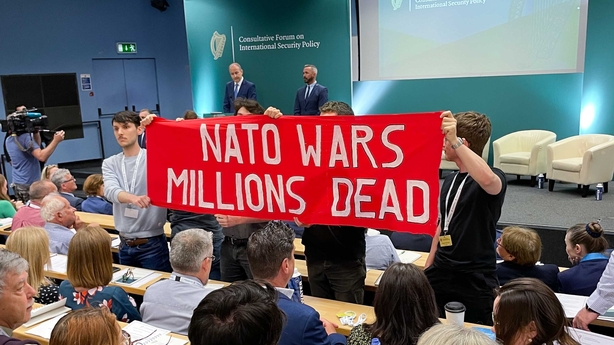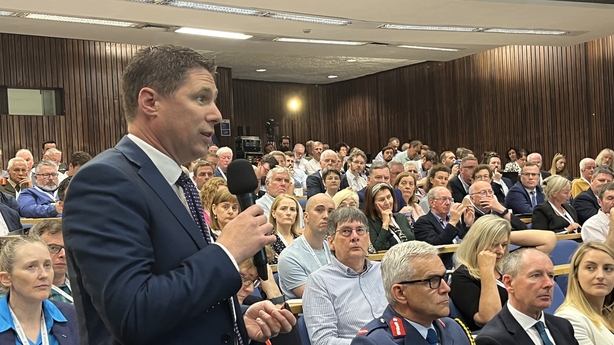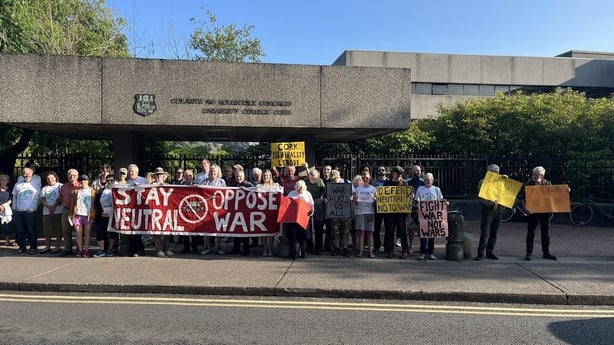Tánaiste Micheál Martin has identified cyber security and marine security as two future areas where Ireland could engage with PESCO - the defence cooperation entity of the European Union.
He said sharing knowledge is the best way to tackle such threats and he backed Professor Brigid Laffan's assertion that PESCO is a good thing, which enables member states to increase their capacity.
The Tánaiste suggested the public should not be "squeamish" about engagement with PESCO.
Asked about the protests at the opening of the Consultative Forum on International Security at UCC, he said they were "not the right approach" and there was "no need for it."
He said he believed in the freedom of speech and the freedom to protest, but there was nothing to fear from the forum, which he characterised as a constructive exercise.

Mr Martin said he was concerned that colleges and universities were "shying away from debates" and said that would be a mistake.
Before he could make his opening remarks this morning, a number of protestors shouted "No to NATO" and unfurled a red banner saying "NATO Wars. Millions Dead".
The Tánaiste then took to the podium and said: "The most undemocratic thing you can do is trying to shut down debate. And that's what you are trying to do."
As he began to read his speech, the protesters were removed by gardaí.
The opening remarks of the chair of the Consultative Forum, Professor Louise Richardson, were also interrupted.
A former Cork county councillor was removed from the auditorium by gardaí.
As Prof Richardson continued with her speech, there were points of order being raised from the floor, but she declined to take them.
One of the first interventions came from the Cork Neutrality League, which sought to raise a point of order that "this forum is unfairly weighted towards supporters of increased militarisation".
Then a group of six or seven students raised an anti-NATO banner and shouted "shame" at the Tánaiste.
Former Green Party councillor Lorna Bogue also tried to raise questions when the forum's chair was making her opening remarks.
There have been no further interruptions since the first panel began to examine the global security environment.

Sinn Féin's spokesperson on foreign affairs Matt Carty told the forum that Ireland should be focused on ending conflict, rather than participating in it.
Speaking from the floor, he said that Ireland's neutrality has served the country well.
Professor Richardson said that the range of views expressed today at University College Cork "disabuse people of the notion that this is, in any sense, a stitch-up".
Speaking to the media after the first day of discussions, she said: "I only agreed to participate in this because I think it's a fantastic idea and a pretty courageous one for the Tánaiste to have undertaken."
Regarding President Higgins questioning of her credentials to conduct the role, Prof Richardson said: "I have been an admirer of President Higgins since my student days.
"I think he made a throw-away remark. He apologised fulsomely and graciously.
"As far as I am concerned, the issue is closed."
Last week, in an interview with the Business Post, President Higgins referred to Prof Richardson as a person "with a very large DBE - Dame of the British Empire".
President Higgins also said Ireland was "playing with fire" during a dangerous period of "drift" in foreign policy.
Asked about the President's wider critique of Irish foreign policy and the suggestion that there is a "drift", she said her personal view was that she "didn't detect any drift towards NATO".
Prof Richardson said that if the President Higgins's comments had drawn more attention to the Consultative Forum, and more people were talking, then that was "a positive."
She said it was "really unfortunate" for people to criticise the fact that she was awarded the title Dame by the British Queen Elizabeth.
Prof Richardson said she recognised it was a "sensitive subject".
However, she said she received the title was for her involvement in a project "ensuring poor kids get into elite universities" and also for assisting the Oxford-AstraZenica vaccine, which was distributed "at cost" and was calculated to have saved 6.3m lives at the end of 2021.
She added: "Irish people abroad go on and do extraordinary things. And to be critical of being honoured abroad for the work that they do, I think is curious for a country for whom emigration is so important."
Regarding the protest mounted by the Connolly Youth demonstrators this morning, she said she respected people's rights to protest, but what she found "unfortunate" was their efforts to prevent others from being heard.
The meeting is the first of four to be held across the country regarding the challenges and threats facing the State, and the policy options available to respond to them.
There were four panels at today's meeting, which are focused on the global security environment; European security in the aftermath of Russian invasion of Ukraine; emerging cyber security threats; as well as maritime security and critical infrastructure.
Among the 17 listed contributors were Brigid Laffan, Emeritus Prof at the European University Institute; Kate Fearon, Deputy Director of the Organisation for Security and Cooperation in Europe's Conflict Prevention Centre; Brigadier General Seán White, Director, Cyber Defence, EU Military Staff; and Christian Bueger, Prof of International Relations, University of Copenhagen.
What is the Consultative Forum on International Security Policy?
Two forum panelists give their views on three key questions

Solidarity TD Mick Barry has claimed the forum has been loaded with speakers who hold pro-NATO views or support of increased European militarisation.
The consultative forum will move to Galway tomorrow for another full day of discussions, including Ireland's triple-lock requirement for UN Security Council backing before Irish Defence Forces are deployed overseas.
There will be two further two days in Dublin, on Monday and Tuesday of next week.
Prof Richardson has said the international security environment has "radically changed" in recent years and countries across Europe are revaluating their foreign and security policies in light of what she called "the new reality".
At the end of the series of four meetings, Prof Richardson, who lectured at Harvard for 20 years on international terrorism and counter-terrorism, will compile a report for the Tánaiste.
Some 1,200 members of the public have registered to attend, with more than 300 submissions to the forum, which will hear from international security experts, members of civil society and NGOs.
With €1.1bn spent on defence last year, Ireland has regularly lagged far below other EU members on defence spending and is accused by critics of relying on its neighbours for security.
Last year, the Government announced it would increase defence spending to €1.5bn by 2028 - the largest increase in defence funding in the State's history.
The consultative forum is an appropriate move by the State, particularly in the context of the war in Ukraine, said DCU Professor of Politics Gary Murphy.
Speaking on RTÉ's Morning Ireland, Prof Murphy, who is taking part in this morning's session said: "It is not the "stitch-up" that some people are suggesting."
"No one has told me what to say, and if they had, I wouldn't be taking part in it."
Assistant Professor in the History of War at UCC Edward Burke, who was also speaking during today's session, said European democracy is "under attack and that is something that needs to be recognised with the war in Ukraine."
He said this is not only a huge issue for Irish citizens but for 400 million other citizens in the EU.
British Ambassador to Ireland Paul Johnston said the decision to hold the forum clearly came from the best of impulses to have an open and inclusive debate on some very important issues.
Speaking on RTÉ's Drivetime, he said: "I think there are ways of registering your views and I think trying to shout down the Tánaiste as he tried to make his opening speech just felt to me like a rather immature and unnecessary way of seeking attention. I think there are better ways to do that."
Mr Johnston said that while he would not comment on comments from President Higgins and on Irish domestic politics, it appeared to him from looking through the lineup of speakers that there was a lot of expertise on a range of issues.
He added the security policy question which he has worked on for over 30 years from the conflict in Bosnia to NATO and UN summits and EU treaties "is a very complicated one".






